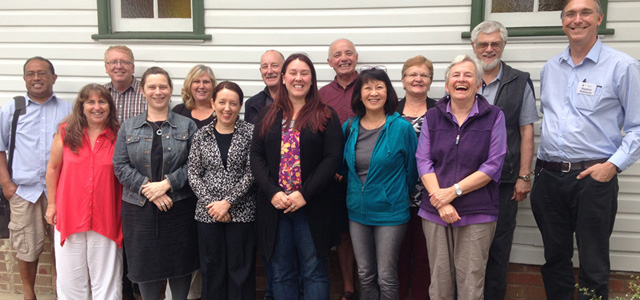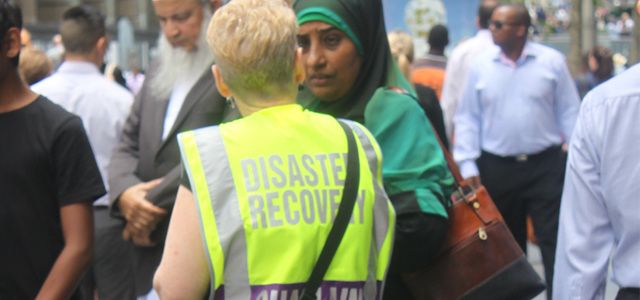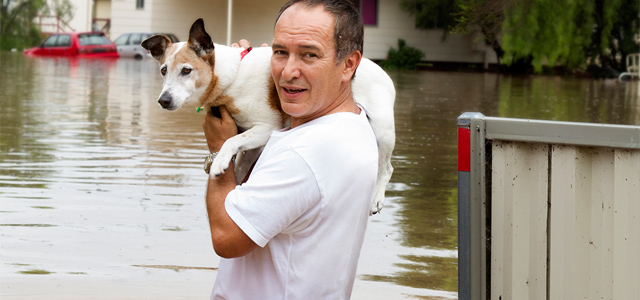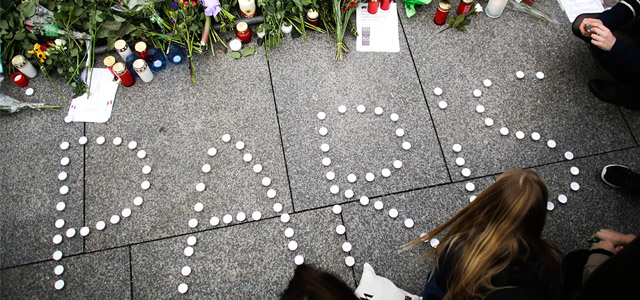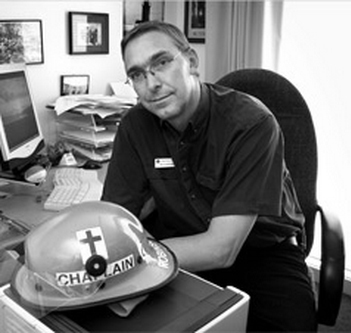As a Uniting Church minister in a parish, Easter was always the season that affected and absorbed me like no other. The danger with hearing any story more than once (let alone many times) is that we can become complacent to its power, so each year I would try to read the gospels accounts of the passion and resurrection of Christ as if for the first time.
The scriptural accounts of the foretelling, betrayal, denial, trial, passion and resurrection of Jesus connect with a great swathe of emotions and human experience. These accounts resonate with so much of our life. Read anew, we can empathise with the disciples’ experience of concern, fear, disappointment, guilt, anger, sadness, grief and hopelessness — even before we join them in their confusion, wonder and joy at the news of the resurrection.
Easter is more than just a good story. It is the point at which God, in Christ, enters every part of our experience, even our despair (“My God, why have you forsaken me?”) and our death.
It’s been more than two years since I conducted Easter worship in a parish setting. For the past two and a half years I have been ministering full-time in the area of disaster recovery as the National Disaster Recovery Officer with the Uniting Church Assembly. This followed some 15 years of ministering part-time in emergency and disaster recovery chaplaincy. In my current role I have worked all over Australia, and increasingly in the Pacific, among people who have experienced loss through disaster, by fire, flood, windstorm, cyclone, accident and terrorism.
In NSW, the Uniting Church Synod is a Community Partner within the State’s welfare plan. During disasters and major emergencies we are present in evacuation centres alongside the Red Cross (which offers personal support and assists in registration of evacuees), the Salvation Army (which supplies food), ADRA (accommodation) and Anglicare (providing personal requisites and support to other agencies). The Synod’s role is to provide ecumenical chaplaincy through the NSW Disaster Recovery Chaplaincy Network (DRCN), which I coordinate with the assistance of a dedicated group of volunteers. This network of nearly 180 ministry agents from a wide range of faiths and denominations cares for people at the most difficult and confronting of times.
As I read the gospel accounts of Easter now, it is increasingly through the eyes of someone who shares time with people beyond the gathered Congregation during “Easter moments” of their lives. These are times where loss is deeply real, death is near or seemingly overwhelming and the world as they have known it is shaken, if not destroyed. This has, if anything, enhanced my understanding of the reality of loss, the value of hope, and the power of the resurrection.
The Road to Emmaus
My favourite Easter story of the gospels is that of Jesus with the two disciples on the road to Emmaus, told in Luke chapter 24 (verses 13 to 35). It reminds me that the initial reaction to the good news of Jesus’ resurrection was not joy, but fear and confusion. The disciples were not in a place to readily accept the hope of the resurrection; they first had to comprehend, if not understand, the costly death of their beloved teacher and friend.
Cleopas and his companion are walking home after a disastrous weekend. Their worldview has been shattered by the devastating events of Good Friday. The one upon whom they had placed all their hopes (v. 21) had been tortured to death.
As they walk, they are talking through every detail of their experience. What they saw, what they heard, in what order it took place, how they felt. They are doing what most of us do when we suffer a life-shattering shock — trying to talk it out and make sense of it.
It’s at this point that Jesus comes beside them, yet they “were kept from recognising him”. (v. 16)
Being there
The essence of chaplaincy is often described as a “ministry of presence”. The very best chaplains I have seen are those who are able to simply come beside people as they move from a place of devastation and loss.
The first and most important gift of this ministry is that, like Jesus himself, we meet people where they are hurting. On the street, as they leave something awful, or as they gather with loved ones to make sense of it all.
When the Quakers Hill Nursing Home fire broke out in November 2011, it led to the evacuation of 90 residents and the death of 11. DRCN fielded a team of seven chaplains in a nearby Anglican church that was set up as a spontaneous evacuation centre.
The level of need was nearly overwhelming. Residents and staff who had been evacuated were being sent on in fleets of ambulances to hospitals and aged-care facilities all over Sydney. The family and friends of residents were also arriving, along with other staff that needed to understand what had happened to those they cared for. DRCN chaplains simply sat with them, working with the police as loved ones waited. We remained with them as they received the all-important news about whether their loved ones’ had survived — or died.
Listening
On the road to Emmaus, Jesus understands that, although he had just died and lived the Easter event, the disciples need to have understanding from their point of view. Rather than jump in with incomprehensible news, he asks them what is going on. “What are you discussing together as you walk along?” (v. 17). He sees the need for them to catch up. We don’t leap into resurrection without processing the reality of death.
And with Jesus asking comes wonderful regard. I love that, time and time again, Jesus asks the people he cares for what they think, and what they want. Even with his supernatural knowledge of their circumstances, Jesus asked the question and respected and dignified their response by listening as they named the thing they felt they most needed.
Along with the ministry of presence, comes the ministry of silence. Being absolutely attentive to the “story” of the person at a point of need. Even if we judge their story is not entirely accurate or fair – it is their story and listening brings with it a regard for a person’s loss and circumstances.
For us, who come from a protestant tradition with a high regard for The Word (and a tendency to bring answers!), this is not easy. The value of first listening to the one feeling the loss is incalculable.
Picking up the pieces
Major Don Woodland is a well-respected (now retired) Salvation Army chaplain, and no stranger to disaster. He uses the metaphor of a jigsaw puzzle to describe a person’s life. As we grow, pieces are added over time to build up a picture of reality, memory and meaning. When a traumatic event happens — that jigsaw picture is shattered, the pieces are scattered, disordered and some lost. The role of the chaplain in these circumstances is to come alongside and to help pick up the pieces. The person’s life will not look the same again. Some pieces may never be found and there will be gaps (such as having lost a loved one). Others may take some time to find and replace. But, as life goes on, the picture will be added to – building again from the edges.
This is what Jesus is doing, as they walk and talk together on the road to Emmaus. He is giving them time, speaking into their lives with fresh vision. He helps them to reframe the context of that weekend as, piece by piece, he brings the bigger picture together to give it new meaning.
Breaking Bread
Joining them on the way, listening to their concerns, and helping them pick up the pieces of their shattered lives, Jesus arrives (still unrecognised) at his followers’ home in Emmaus. Jesus is given the honour of offering the blessing for the meal and, as he breaks bread with them, something powerful happens. Perhaps it was the memory of words spoken and bread broken at a previous table, but maybe something more.
There is something wonderful about breaking bread with people at a time of crisis. Our chaplains make a point of being at the meal tables in evacuation centres. The act of sharing a meal transcends a professional/client relationship to be something that is more akin to family or friends.
After floods, chaplains go out on the streets, joining people experiencing the grief of returning to their water-ruined, mud-filled homes. They share the loss of those beginning to make decisions about the long, difficult journey to recovery.
Sharing Easter hope
I am absolutely reliant on Easter – for only in what Jesus did can I join completely with God, to overcome all that can come against me. Christ’s actions throughout the events of Easter give us blessing, forgiveness, healing, assurance, salvation, and eternal life.
In disaster recovery chaplaincy, we share life with people who will say they have “lost everything”. Life as they know it has been shattered, and all they have depended on appears to be gone – houses, possessions, even loved ones. The present is unimaginable; can there possibly be hope in the future? Our very presence and ministry brings a quiet assurance that there is more than this. This is not the end.
The role of chaplaincy offers connection and hope. To walk onto a fire-ground and hear the words, “Thank God, the chaplain’s here.” To stand with numbed crowds laying flowers and cards following the Martin Place siege. To have someone tap your shoulder and say “thank you for being here”, is a reminder that, through and beyond us, the risen Christ continues to walk alongside suffering people. Even as we are sustained by the sure and certain hope of the risen Christ, we allow other people to lean upon us, and bring God’s assurance that this is not the end. A new day will come.
Rev. Dr. Stephen Robinson is the National Disaster Recovery Officer with the Assembly of the Uniting Church



